Well, it’s the last day of 2016 here, and I’m going to assume that I won’t receive any more rejections or acceptances in the next 12 hours, and sum up my year’s progress in the field of short stories.
My goals this year were to write 15 stories, make 60 submissions, and (a late addition) have 15 stories on submission at one time.
Partway through the year, I achieved the 60 submissions and set a new goal of 75.
I actually wrote 10 stories (that I subsequently submitted), made 74 submissions – one short of my revised goal – and had a maximum of 13 stories on submission at one time.
I’m relaxed about the fact that I didn’t make the numbers; they’re a way to keep score and motivate myself, not some kind of mystical obligation. And I did, after all, exceed my initial submission goal, which was already up from the 52 submissions I made last year.
My number of form rejections, predictably, went up more or less proportionately with the number of submissions: 45, versus 29 last year. Personalised rejections also went up, by approximately the same percentage: 18, versus 13 last year. The number of acceptances actually halved, though, from 8 to 4. My explanation for this is that I was being more ambitious in the markets I submitted to this year.
Three out of those four sales were at professional rates, versus only one out of eight last year, and that’s reflected in the fact that my year’s income from short stories went up from $354.09 to $680.78. (I’m counting the $200 I got from providing two “treatments” to a futurist consultancy, since I wouldn’t have got that opportunity if I hadn’t already been a short story writer with professional sales.)
This means my lifetime income from short stories is now over $1000 (USD), based on 13 paying acceptances out of 174 submissions. That’s a hit rate a little better than 1 in 14, which actually isn’t bad for the industry.
Full details behind the link, if you’re interested, including markets, timings, and statistics.
http://csidemedia.com/shortstories/goals-aspirations-and-achievements/
